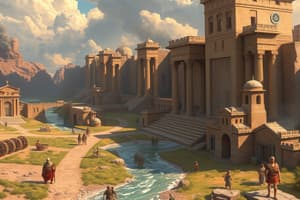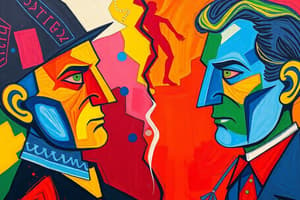Podcast
Questions and Answers
What is the main focus of the study of history?
What is the main focus of the study of history?
- To analyze current events
- To predict future trends
- To study past events, societies, and cultures (correct)
- To promote political ideologies
Which period marks the beginning of Ancient History?
Which period marks the beginning of Ancient History?
- Before 3000 BCE
- The rise of feudalism
- The fall of the Western Roman Empire
- Around 3000 BCE (correct)
What does Medieval History primarily characterize?
What does Medieval History primarily characterize?
- The founding of major world religions
- Feudalism and the rise of empires (correct)
- The Age of Exploration and Enlightenment
- The Industrial Revolution
Which type of sources are considered primary sources?
Which type of sources are considered primary sources?
What key theme in history involves examining what changes and what remains the same over time?
What key theme in history involves examining what changes and what remains the same over time?
What does historiography study?
What does historiography study?
Which of the following events is considered significant in marking the beginning of the Medieval period?
Which of the following events is considered significant in marking the beginning of the Medieval period?
Which figure is known for creating one of the largest empires in history?
Which figure is known for creating one of the largest empires in history?
Flashcards are hidden until you start studying
Study Notes
Definition of History
- Study of past events, societies, and cultures.
- Involves interpretation of evidence and making connections.
Major Divisions in History
-
Prehistory
- Time before written records.
- Study of artifacts, fossils, and oral traditions.
-
Ancient History
- From the beginning of writing (~3000 BCE) to the fall of the Western Roman Empire (476 CE).
- Key civilizations: Mesopotamia, Ancient Egypt, Indus Valley, Ancient China, and Mesoamerica.
-
Medieval History
- From the fall of Rome to the beginning of the Renaissance (5th to 15th centuries).
- Characterized by feudalism, the rise of empires, and the spread of religions.
-
Modern History
- From the Renaissance to the present (15th century to now).
- Significant events: Age of Exploration, Enlightenment, Industrial Revolution, World Wars.
Methods of Historical Study
-
Primary Sources
- Original documents or artifacts from the time period (e.g., letters, diaries, official records).
-
Secondary Sources
- Analyses or interpretations of primary sources (e.g., history books, articles).
Key Themes in History
-
Change and Continuity
- Examining what changes over time and what remains the same.
-
Cause and Effect
- Understanding why events happen and their impacts.
-
Historical Interpretation
- Different perspectives and narratives around the same events.
Important Concepts
-
Chronology
- The arrangement of events in the order they occurred.
-
Historical Context
- The social, economic, and political backdrop against which events occur.
-
Historiography
- The study of historical writing and methods.
Notable Historical Figures
- Alexander the Great: King who created one of the largest empires.
- Julius Caesar: Roman general and statesman, pivotal in the transition from Republic to Empire.
- Genghis Khan: Founder of the Mongol Empire, known for military tactics and empire expansion.
Significant Events
- The Fall of Rome (476 CE): Marked the beginning of the Medieval period.
- The Signing of the Magna Carta (1215): Foundation for modern democracy and legal systems.
- The Industrial Revolution (18th-19th centuries): Major shift in industry and economy.
Historical Analysis
- Historians use critical thinking to synthesize different sources.
- Analysis involves understanding bias, perspective, and purpose in historical narratives.
Conclusion
- History is an ever-evolving field that helps us understand human behavior, societal development, and cultural heritage. It requires critical analysis and an appreciation of diverse perspectives.
Studying the Past
- History is the study of past events, societies, and cultures. Involves interpretation of evidence and making connections.
Major Eras in History
- Prehistory: Time before written records. Study of artifacts, fossils, and oral traditions.
- Ancient History: From the beginning of writing (~3000 BCE) to the fall of the Western Roman Empire (476 CE). Key civilizations: Mesopotamia, Ancient Egypt, Indus Valley, Ancient China, and Mesoamerica.
- Medieval History: From the fall of Rome to the beginning of the Renaissance (5th to 15th centuries). Characterized by feudalism, the rise of empires, and the spread of religions.
- Modern History: From the Renaissance to the present (15th century to now). Significant events: Age of Exploration, Enlightenment, Industrial Revolution, World Wars.
Methods of Studying History
- Primary Sources: Original documents or artifacts from the time period (e.g., letters, diaries, official records).
- Secondary Sources: Analyses or interpretations of primary sources (e.g., history books, articles).
Key Themes in History
- Change and Continuity: Examining what changes over time and what remains the same.
- Cause and Effect: Understanding why events happen and their impacts.
- Historical Interpretation: Different perspectives and narratives around the same events.
Essential Concepts
- Chronology: The arrangement of events in the order they occurred.
- Historical Context: The social, economic, and political backdrop against which events occur.
- Historiography: The study of historical writing and methods.
Notable Figures
- Alexander the Great: King who created one of the largest empires.
- Julius Caesar: Roman general and statesman, pivotal in the transition from Republic to Empire.
- Genghis Khan: Founder of the Mongol Empire, known for military tactics and empire expansion.
Significant Events
- The Fall of Rome (476 CE): Marked the beginning of the Medieval period.
- The Signing of the Magna Carta (1215): Foundation for modern democracy and legal systems.
- The Industrial Revolution (18th-19th centuries): Major shift in industry and economy.
Historical Analysis
- Historians use critical thinking to synthesize different sources.
- Analysis involves understanding bias, perspective, and purpose in historical narratives.
Conclusion
- History is an ever-evolving field that helps us understand human behavior, societal development, and cultural heritage. It requires critical analysis and an appreciation of diverse perspectives.
Studying That Suits You
Use AI to generate personalized quizzes and flashcards to suit your learning preferences.





